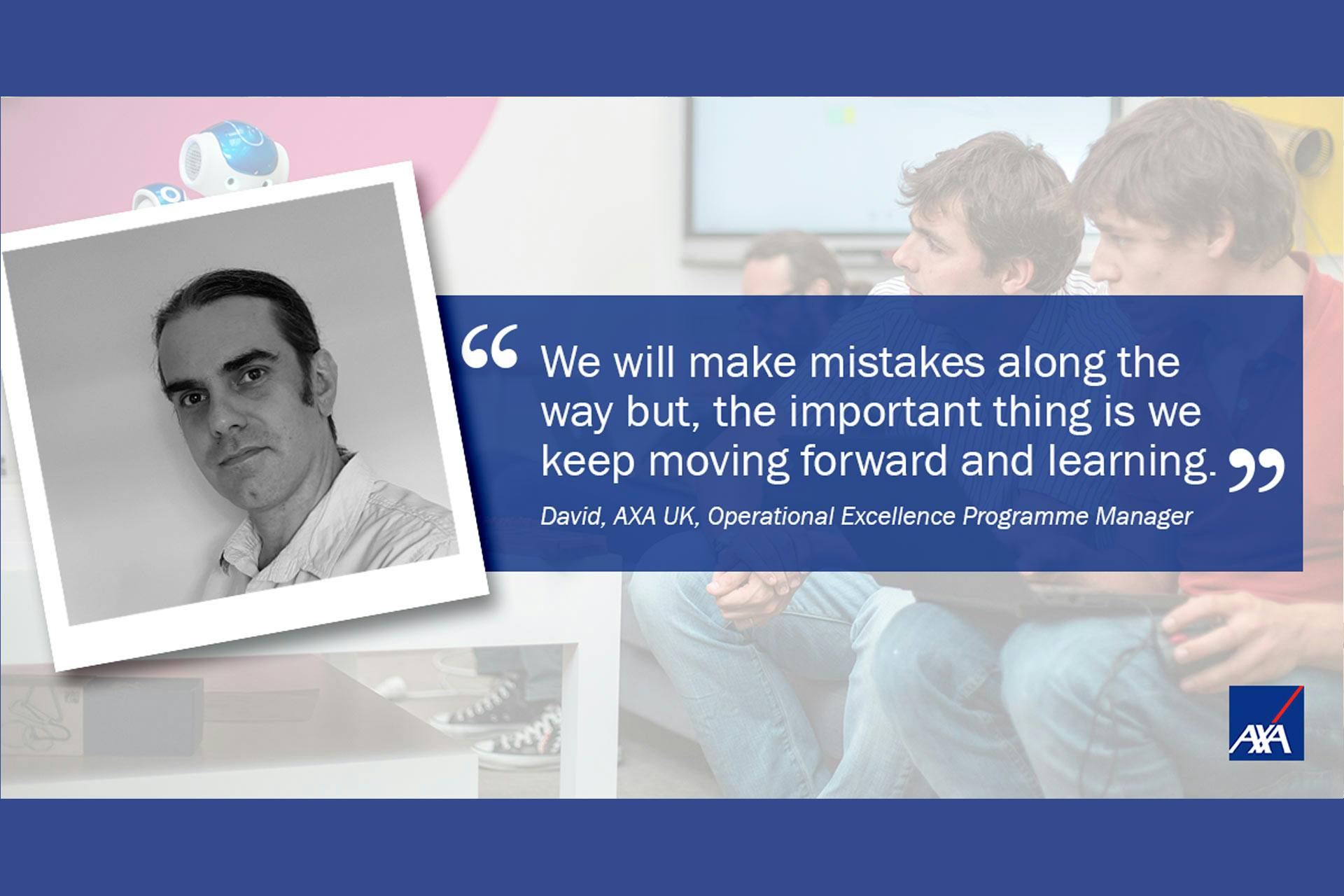
September 21, 2016
Back to work: How to persist with innovation while being prepared to walk away
In the third of our Back to Work series on innovation in the workplace, we meet David from AXA UK.
3 minutes
Discover how his experience with AXA’s employee innovation program, Start-in, has taught him the value of failing fast and why determination and tenacity are so important when innovating.
Can you briefly introduce yourself?
I joined SunLife on the 1st January 1999, as a trainee in the pensions department. This was just months before we started to become part of the AXA Group. My career with AXA has been quite diverse, moving from Pensions to Workforce management and then 10 years ago to a career in Lean and Six Sigma (methodology and tools for improving processes and performance). Today, I work in the UK Business Architecture Team looking after our Operational Excellence Capability.
In my free time I enjoy horse riding with my family, a spot of archery and when I have time to sit down and relax, I like making clothes or building things, usually for my daughter.
Why did you choose to participate in Start-in?
AXA always offers great opportunities to get involved in interesting things and Start-in is one of them. I try to get involved in whatever I can, but really you need your time, ideas and interest to align. This year was one of those times for me.
How did you manage to combine private and professional lives while working on your project?
I’ll be honest, it was tough. I think that what helped the most was keeping my manager and family involved, and being clear on what I needed to do. They were all very supportive and my 4 year old daughter was a great critic on our video submission. To be successful you need support and also to be clear on what you are personally willing to invest in an opportunity such as this.
How do you perceive innovation in general and in particular at AXA?
Innovation is a tricky thing to foster in a company. In my view it means one simple thing; try and be better tomorrow than we are today. To do this, it takes everyone identifying problems or opportunities and finding ways to fix or take advantage of them, however small they may be.
To make it part of your culture though you need the right balance of people, tools and climate.
In AXA, we are on this journey, but the messages still need to be translated down through all levels of the company. Sometimes people have great ideas but lack the right climate, skills and support to make it a reality.
So we have plenty of work to do and we will make mistakes along the way, but the important thing is we keep moving forward and learning.
What have you learnt from your experience that will be useful for the rest of your career?
The most useful thing I’ve learnt was to be clear on what you are willing to sacrifice and the minimum you need to do to test a viable product. Then, if it doesn’t work out, you can walk away, learn and try something new, rather than endlessly dragging it out in the hope it might work out for the best.
What would you do differently if you could do it all again?
I honestly think that the three of us in the team gave our best and we did get to the final 10. We are now continuing with the idea, still aim to get the new service launched and are gathering interest, so there is nothing I would change about this year’s entry.
If I did this again though, I would make sure to get more people involved early on, in helping and supporting the idea and the development. I’ve been amazed at how willing people have been, and still are, to help out.
If you could offer one bit of advice to other innovators what would it be?
Test your idea on friends and family, if you can’t sell it to them quickly, then you won’t be able to sell it to a panel. This is so easy to do using social media and you will find they are also a good source of ideas and directions you hadn’t thought of.
What key skills do you think are important when innovating?
I believe we can all have those sparks or lightbulb moments, but being innovative isn’t just about having a head full of ideas, it’s about turning them into something; be that a new product or learning from an unsuccessful idea.
I think some of the key skills are being able to be both tenacious and knowing when to quit. Tenacity is important; as to get from an idea to a Minimum Viable Product you have to drive yourself, persist and be determined. It is equally important to recognise when something is not going to work out and be prepared to walk away after investing time and money, it just might not be the right time or the only customer may be you!



